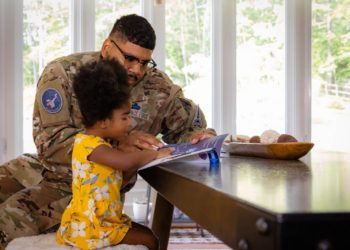I can still remember the first time we packed up a U-Haul for our initial military move. I didn’t even know what PCS stood for, or any of the other military acronyms. The road ahead—literally and figuratively—seemed so long that we kept ourselves living in the present, rather than planning for the future—or what would come next. Well, next has arrived on my doorstep and its name is retirement.
My husband has been a Marine for more than 19 years. His career has paralleled our entire adult lives, and it is no exaggeration to say I have known nothing else. We have had little say in when we would be together and apart, where we would live, or how long we would live there. For the latter part of his career, I desperately longed for retirement so that we could have some normalcy for our family. Now that this time is here, I am completely overwhelmed by the concept of making our own decisions. That may sound ridiculous, but I sort of got used to riding passenger with the military in the driver’s seat.
The irony of the situation is choosing where we will call home has been the biggest point of contention in my marriage in a very long time. He has his priorities, I have mine, and they happen to exist in different states.
Evaluate your family’s needs
Jenna Lang, Legislative Coordinator for National Military Family Association, says it is never too early to start planning for that transition to post-military life–including location. She explains there are several things to consider.
“Military families need to look at their own unique needs when deciding where to live. These include: job opportunities (for both the transitioning service member and spouse), family requirements (are good public schools important, proximity to extended family, or possible further education opportunities for the transitioning service member), as well as access to a VA Center if needed,” Lang explained.
In attempting to narrow down what is best for everyone in my household, there are four categories I came up with. These will differ for everybody, but should intersect when you are comparing locations.
- Close proximity to extended family
- Job market
- Close proximity to a duty station that’s familiar
- Cost-of-living
Luckily, research tools exist to help attach facts and data to each of the location choices. [However, the emotional part of choosing home will require a completely different process.] Resources include information on cost-of-living from one place to the next, school ratings, crime statistics, and even the nitty gritty details of things like what state will tax military pension.
Below are a few starter points to help make the case for your desired forever home:
Sperling’s Best Places allows users to compare the cost-of-living from one city to the next. The site includes a breakdown of costs, such as food, housing, and transportation.
Great Schools – a national nonprofit, has a rating system that lets parents compare schools in different areas and within the same area.
Forrest Baumhover, a retired military officer and Certified Financial Planner, created a site called Military in Transition. He took the time to list out the marginal tax rate per state along with which states tax and do not tax military pensions.
And, in the digital era, families have continuous access to real-time information and advice from fellow military spouses. There are social media pages and groups dedicated to sharing personal perspective on this and that. I took to Facebook to crowdsource current and soon-to-be retiree spouses on general lessons learned when approaching retirement.
Here’s what they shared:
- Prepare for the first full year of civilian income taxes because the untaxed portion of income decreases significantly.
- Prepare for the gap of time when the last active duty paycheck comes, and when the first retirement paycheck will arrive. Typically around four weeks, according to experts.
- Attend the retirement course with your service member – and consider attending twice (at 12 and 24 months).
- Find a VSO [Veteran Service Organization] to connect with for assistance with the VA paperwork process. Examples are VFW, DAV, and American Legion.
- Ask your service member to go to medical and have everything checked and documented. This can streamline the process with the VA.
These are just a few of the many, many points that were shared with me about planning for life after the military. Perhaps the most surprising was that several spouses admitted that the process of retirement was far more stressing on their marriage than any other component of military life–to include deployments. Couples are forced to make decisions unlike they have ever had to make, plus the added stressor of needing jobs and removing the engrained military identity that has guided most of your service member’s life. Talk through each step of the decision-making process and listen to one another’s points. By the time you make it to this life event, you have likely overcome far more than most couples do in a lifetime. Work as a team to build the very best next chapter possible, even if you have to concede on smaller details like zip code.
Read comments
































